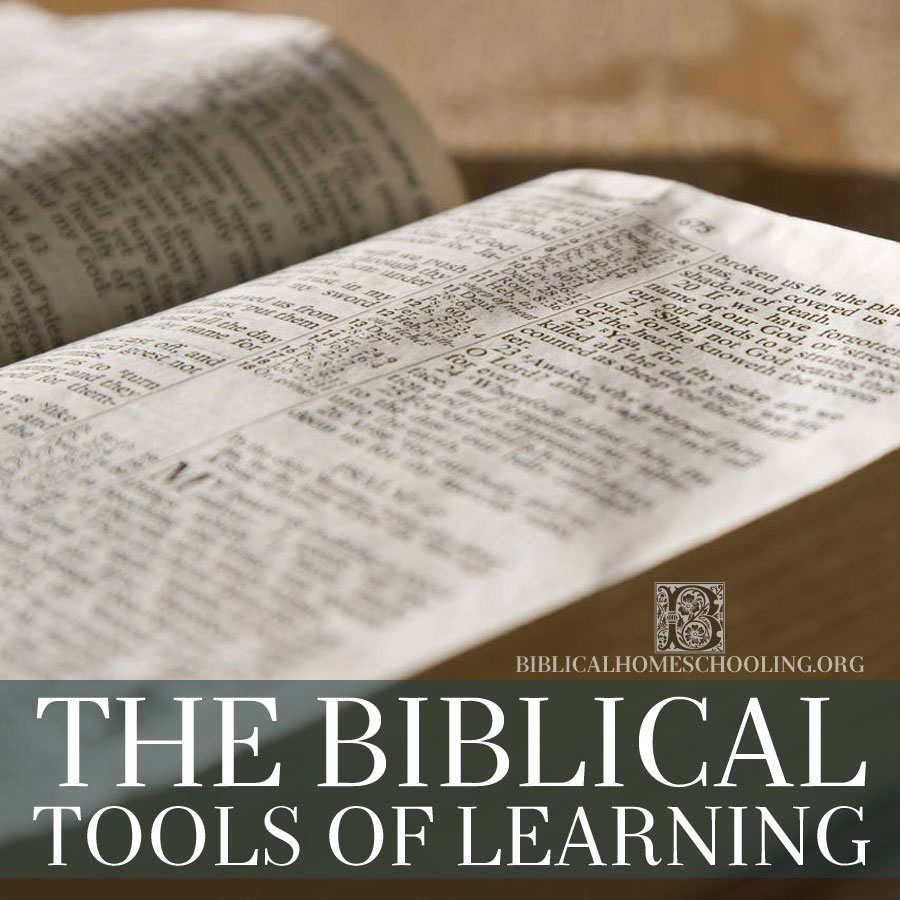Classical educators describe three tools of learning, necessary for a child to grow into the power of his mind, to train his mind to think rightly. They are grammar, dialectic, and rhetoric, and correspond to three stages of learning. This education theory stretches back to classical antiquity – ancient Greece and Rome – when it was first identified as such. The history of education in Western Civilization is the history of classical education, or learning by these three tools of learning.
The Bible interestingly enough likewise describes three “stages of learning,” although it does so without labeling them in the same way as the classical educators:
Then the Lord spoke to Moses, saying: “See, I have called by name Bezalel the son of Uri, the son of Hur, of the tribe of Judah. And I have filled him with the Spirit of God, in wisdom, in understanding, in knowledge, and in all manner of workmanship, to design artistic works, to work in gold, in silver, in bronze, in cutting jewels for setting, in carving wood, and to work in all manner of workmanship. Exo 31:1-5
‘Choose wise, understanding, and knowledgeable men from among your tribes, and I will make them heads over you.’ Deu 1:13
To know wisdom and instruction, To perceive the words of understanding, Pro 1:2
For the Lord gives wisdom; From His mouth come knowledge and understanding. Pro 2:6
The Lord by wisdom founded the earth; By understanding He established the heavens; By His knowledge the depths were broken up, And clouds drop down the dew. Pro 3:19-20
My son, pay attention to my wisdom; lend your ear to my understanding, that you may preserve discretion, and your lips may keep knowledge. Pro 5:1-2
The fear of the Lord is the beginning of wisdom, And the knowledge of the Holy One is understanding. Pro 9:10
A scoffer seeks wisdom and does not find it, But knowledge is easy to him who understands. Pro 14:6
Then the king instructed Ashpenaz, the master of his eunuchs, to bring some of the children of Israel and some of the king’s descendants and some of the nobles, young men in whom there was no blemish, but good-looking, gifted in all wisdom, possessing knowledge and quick to understand, who had ability to serve in the king’s palace, and whom they might teach the language and literature of the Chaldeans. Dan 1:3-4
For this reason we also, since the day we heard it, do not cease to pray for you, and to ask that you may be filled with the knowledge of His will in all wisdom and spiritual understanding; Col 1:9
There are many more places in Scripture where the concept of understanding is folded in to wisdom, so that knowledge is as the elementary or first level of learning, and wisdom (with understanding implied) is as the secondary or higher level of learning:
Then God said to Solomon: “Because this was in your heart, and you have not asked riches or wealth or honor or the life of your enemies, nor have you asked long life— but have asked wisdom and knowledge for yourself, that you may judge My people over whom I have made you king— wisdom and knowledge are granted to you; and I will give you riches and wealth and honor, such as none of the kings have had who were before you, nor shall any after you have the like.” 2 Chr 1:11-12
‘Job speaks without knowledge, His words are without wisdom.’ Job 34:35
I neither learned wisdom Nor have knowledge of the Holy One. Pro 30:3
For in much wisdom is much grief, And he who increases knowledge increases sorrow. Ecc 1:18
The ancient Greeks and Romans observed and described the same three stages of learning that the Bible calls knowledge, understanding, and wisdom. Isaac Newton observed apples falling to the ground from the tree, and described the law of gravity, but did not invent gravity; and just so the Greeks and Romans did not invent the progression of learning. The West retained the terms of classical antiquity rather than the biblical terms (the Bible being closed to the West until the Reformation, while the classics were not).
However, where have their applications been informed by their Greek worldview instead of a Hebraic one? What vestiges of the Greek worldview has the West retained? Now, God is restoring the Hebraic worldview to the West, that is, its biblical foundation. How do the Scriptures apply knowledge, understanding, and wisdom to education?
To be continued …

2 thoughts on “THE BIBLICAL TOOLS OF LEARNING”
Looking forward to the continuation of this post! 🙂
Thank you Sandra!